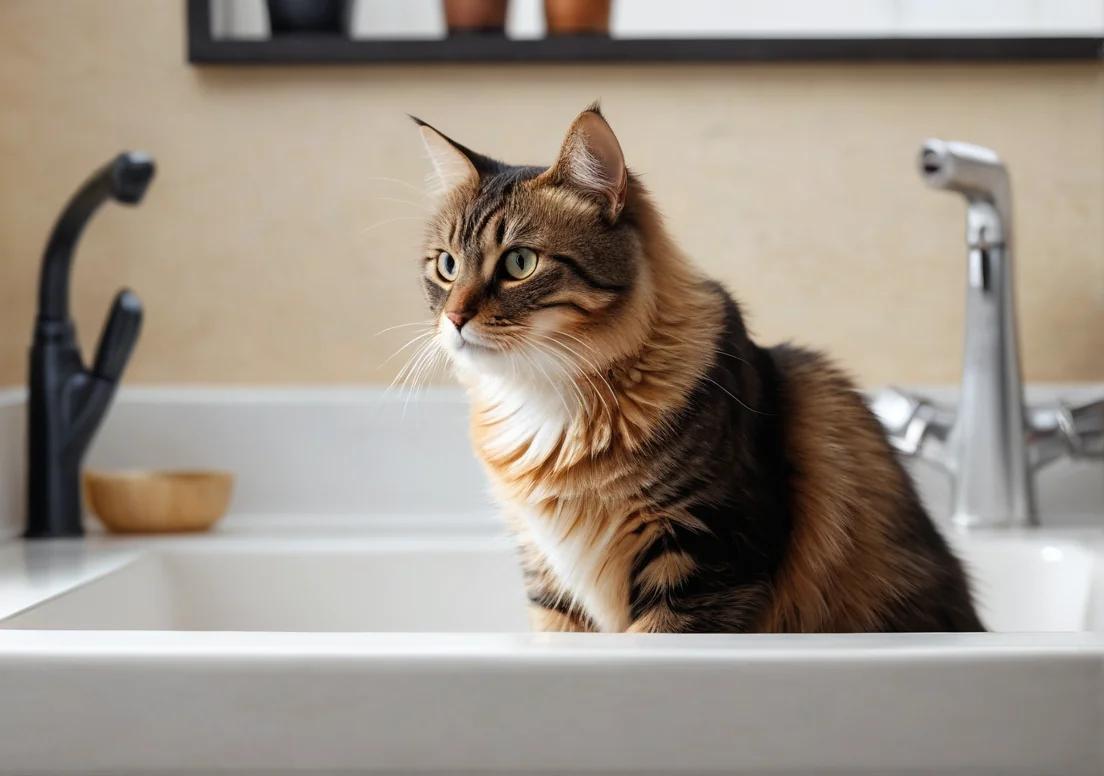Do you find your cat opting for the sink instead of their litter box? It’s more common than you think, and the behavior can leave you scratching your head. Understanding your feline friend’s quirks is essential to keeping the peace at home.
Cats may urinate in the sink for several reasons, including territorial marking, health issues, or simply a preference for that particular spot. Yet, this behavior often points to deeper concerns or desires that are well worth exploring, so stick around to uncover what might really be behind this puzzling habit.

Why is the Sink Appealing to Cats?
Cats have a knack for surprising us with their quirky habits, and urinating in the sink is a prime example. So, why would your furry friend choose this spot? For starters, sinks often provide a few things that cats find irresistibly appealing.
The cool surface of a sink can feel refreshing, especially during warmer months, giving them a comfortable place to chill. The height of a sink allows cats to feel more secure and in control of their surroundings, akin to their natural instinct of climbing to higher spots.
Many cats are also fascinated by running water. They may prefer a sink over a litter box simply because the sound and movement of water pique their interest. It can turn an everyday bathroom fixture into an exciting playground.
Additionally, sinks generally have a clean scent compared to a litter box, which may make them more appealing. Cats are instinctively clean animals, and they might simply be following their nose to a spot they find more pleasant for their bathroom needs.
Being aware of these instincts can help you address their behavior more effectively.
Is There a Medical Reason for the Behavior?
It’s vital to consider that urinating in the sink might not just be a quirky behavior—there could be underlying health concerns. Common problems such as urinary tract infections (UTIs) might drive your cat to seek out alternative spots, prompting them to avoid their litter box due to discomfort or pain.
Cats with UTIs often exhibit other symptoms like frequent urination, straining while trying to urinate, or even blood in their urine. It’s essential to monitor for these signs because, if left untreated, health issues can escalate quickly.
Other serious conditions, such as kidney disease or diabetes, may also lead to changes in bathroom habits. A sudden change in urination patterns can be an important indicator of a health problem that requires immediate veterinary attention.
If you notice your feline friend frequently using the sink or displaying any of these symptoms, don’t hesitate to consult with your vet. Early diagnosis can make a world of difference in keeping your cat healthy and happy.
Are There Behavioral Factors at Play?
Cats are creatures of habit, but changes in their environment can throw them for a loop. Stress or anxiety can trigger unusual behaviors, including using the sink instead of the litter box. A new pet, a recent move, or even alterations in your daily routine can lead to a cat feeling unsettled.
When a cat experiences stress, its natural instincts kick in. Instead of seeking comfort in familiar places, it might choose a spot like the sink because it feels less safe in its usual surroundings. Cats are also sensitive to changes in their owner’s behavior; if you’re feeling stressed, your cat might pick up on that and react by changing its habits.
Another interesting angle is territorial behavior. If your cat feels like its territory is threatened—maybe a new family member or even a moving box in the corner—it might resort to what it thinks is a safer spot to mark its territory. Providing a quiet, undisturbed place for your cat can help alleviate some of this anxiety and encourage it to return to the litter box.
How Does Litter Box Setup Impact Sink Use?
Your cat’s litter box setup plays a crucial role in its bathroom habits. If the box is dirty or difficult to access, your feline friend might opt for the sink instead. Here are a few factors to consider:
Cleanliness : Cats are fastidious creatures. If the litter box isn’t cleaned regularly, your cat might look for cleaner alternatives, like the sink. Aim to scoop it daily and do a thorough wash at least once a week.
Location Matters : The litter box should be in a quiet, low-traffic area. If it’s hidden away in a noisy place or near a washer and dryer, your cat may feel uneasy using it. An easily accessible, quiet spot can make a big difference.
Type of Litter : Cats have individual preferences. Experiment with different types of litter—clumping, non-clumping, or natural options might attract your cat back to the box instead of the sink.
Number of Boxes : A rule of thumb is to have one more litter box than the number of cats in your home. This can reduce competition and give your cat options, especially if it doesn’t want to share.
By adjusting these factors, you might just find that your cat prefers the litter box after all.
Is Your Cat Trying to Communicate Something?
Your cat’s choice to urinate in the sink isn’t just an odd quirk; it can signal a range of underlying issues. If your feline friend is opting for the sink instead of their litter box, they might be trying to communicate discomfort or dissatisfaction.
Cats are inherently clean animals, and many prefer a pristine litter box. If it hasn’t been cleaned recently or isn’t up to their standards, your cat could be saying, “This isn’t okay!” Additionally, a change in the household—like new pets, moving, or even a recent renovation—can lead to stress, prompting your cat to seek out different places for relief.
Health issues can also be at play. Conditions like urinary tract infections, bladder stones, or other medical problems can make it painful for your cat to urinate, leading them to avoid their usual spot. If you notice any other signs of distress, such as constant grooming of the genital area or straining to urinate, it’s best to consult your vet right away.
What Can You Do to Change This Behavior?
Redirecting your cat’s bathroom habits back to the litter box involves a few targeted steps. Start by ensuring the litter box is clean and appealing. Scoop it at least once a day and do a thorough wash weekly. Consider switching to a litter type they prefer, as cats have individual preferences.
Location matters too. Place the litter box in a quiet, low-traffic area—cats love their privacy. If there are multiple cats in the house, consider having one more box than you have cats to prevent territorial issues.
When it comes to the sink, you can take proactive measures by blocking access. If you have a sink cabinet, keep it closed or consider using a deterrent like a citrus spray, as cats usually dislike that smell.
Finally, try positive reinforcement. Whenever your cat uses the litter box, shower them with praise or a small treat. This encourages them to associate the box with positive experiences, making it their preferred bathroom spot once again.
Sometimes, making a small adjustment can lead to big changes!
What Are the Risks of Ignoring This Behavior?
Ignoring your cat’s decision to use the sink instead of the litter box can lead to a cascade of issues that may affect both their health and your household. First off, if your cat is urinating outside the litter box, it could signal underlying health concerns such as urinary tract infections or kidney problems. These conditions can become serious if left unaddressed, possibly leading to prolonged pain or more invasive treatments later on.
Additionally, this behavior might escalate into more habitual issues. If your cat feels it can choose unconventional spots for relief, it may start avoiding the litter box altogether, complicating your cleaning routine and creating an unpleasant environment. It’s important to note that urine marking can also be a sign of stress or territorial issues. This can affect your cat’s emotional well-being and may cause further behavioral problems.
Finally, if your cat is opting for the sink, that area may develop a strong odor, which is challenging to eliminate. Over time, you might find yourself facing not just a hygiene issue but potential conflicts with household members about cleanliness. Addressing the problem now saves you a world of hassle down the line.
Are There Unique Facts About Cat Behavior?
Cats are a bundle of quirks, and their behaviors often seem bewildering. For instance, did you know that cats have a strong preference for clean spaces? They tend to avoid dirty litter boxes, which leads some felines to seek alternatives like sinks or bathtubs that feel fresher to them.
Another intriguing trait is their fascination with water. While most cats might appear aloof to it, many actually enjoy playing in or near water, making the sink an attractive spot for exploration or even a makeshift water bowl. Raised surfaces also provide cats with vantage points—a prime cat instinct that makes the sink a preferred place, especially if your feline wants to observe the happenings around the household.
Moreover, some cats may develop a preference for certain surfaces due to texture. Cold, smooth surfaces can be appealing, especially in warmer months, as they offer a cool place to lie or even urinate. Lastly, this behavior can be linked to separation anxiety or a need for attention, prompting your cat to do something unusual to grab your focus.
Alex, a passionate animal lover, has experience in training and understanding animal behavior. As a proud pet parent to two dogs and three cats, he founded AnimalReport.net to share insights from animal experts and expand his knowledge of the animal kingdom.




